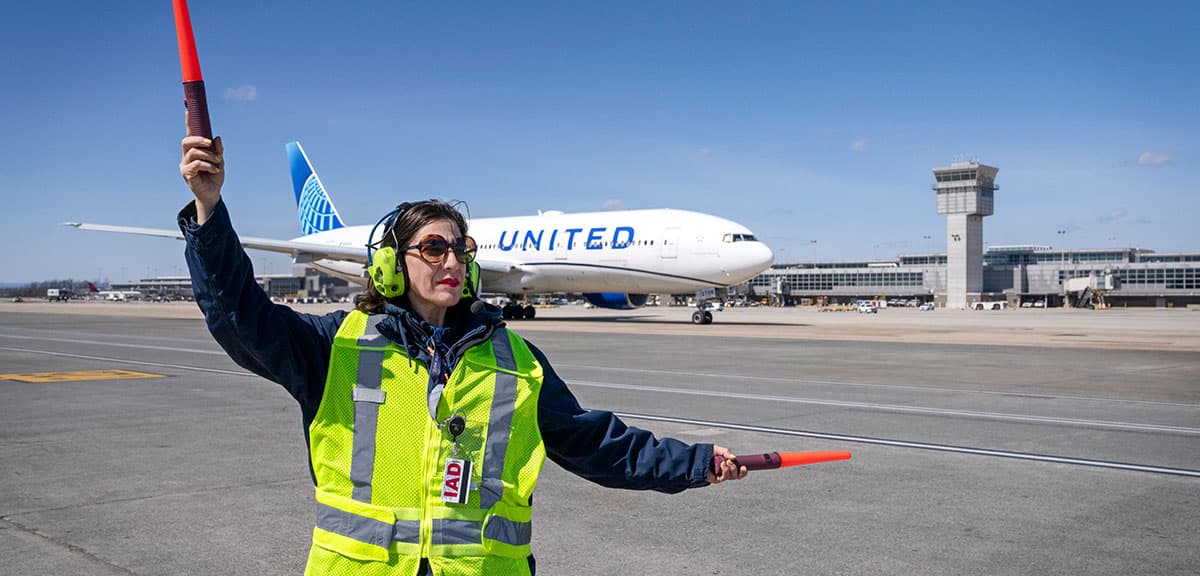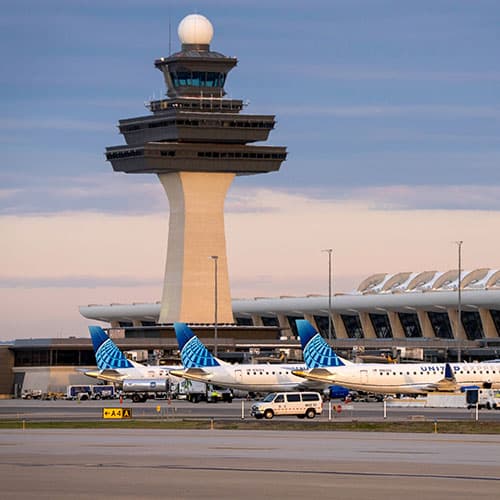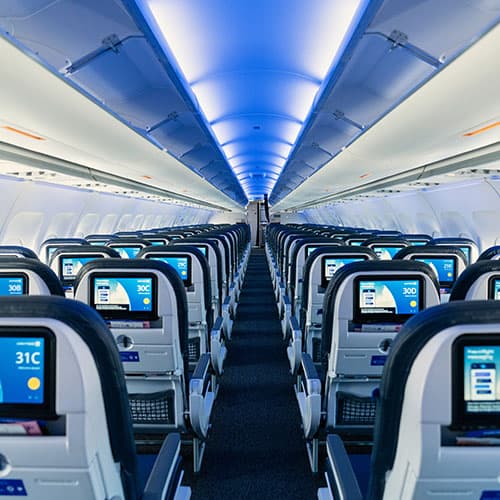
In 2024, Congress passed, and the President signed into law, a reauthorization of the Federal Aviation Administration (FAA) that included important safety and efficiency investments in the National Airspace System. United continues to engage policymakers and stakeholders to support implementation of the reauthorization and advocate for additional policies that prioritize the safety, efficiency and reliability of our nation’s aviation system. We are especially focused on the nation’s Air Traffic Control (ATC) system and supporting the system’s technology, infrastructure and workforce needs.
As United continues to invest in new aircraft with advanced technologies and systems, collaboration with government partners is critical to realizing the benefits of a modern ATC system. We continue to champion these causes with industry organizations including Airlines for America and the International Air Transport Association, as well as with government agencies.

Strengthening the air traffic control system
Commercial aviation in the United States, under the FAA’s leadership, remains the safest in the world. This achievement was earned through close collaboration between users of the national airspace system and the FAA. To maintain the highest safety standards and facilitate growth in U.S. aviation, United believes that the FAA must address the chronic controller shortages that are causing disruptions to airline operations, affecting employees and customers alike. Although the FAA has taken important steps to increase the number of air traffic controllers, there is more work left to do to adequately address ATC staffing shortages. Currently, the FAA Academy is operating at capacity, but the need for additional air traffic controllers far exceeds the numbers of controllers expected to graduate and become certified professional controllers.
United will continue to work closely with the new Secretary of Transportation, FAA Administrator, and leadership of the FAA’s Air Traffic Organization in its efforts to increase capacity for training and hiring to address critical areas of need across our aviation system. We hope to work with the FAA to expand its controller training partnerships with private aviation colleges and universities to increase training capacity and address the near and long-term ATC workforce shortages.
Further, it is vital that the FAA has adequate, stable and predictable resources to invest in its facilities, technology and personnel, so that the United States continues to lead the world as the safest and most efficient aviation system. United will continue to work with leaders in Congress and the Administration to that end.

United Next
United Next, our enterprise-wide investment in fleet, network, airports and customer experience, is underway. Over the next decade we intend to introduce more than 800 mainline aircraft to our fleet and expand our global network and reach new points on the map. To support the United Next goals, we engage government bodies, including the Department of Homeland Security and its sub-agencies, the Transportation Security Administration and U.S. Customs and Border Protection, the FAA and others to ensure smooth execution and collaborate on innovative solutions to improve the passenger experience. United anticipates significant network and passenger growth, so it is vital that we partner with public sector partners to maintain a high level of security and facilitate an efficient, positive customer journey.
We also engage state and local government officials in efforts to modernize our airports including major terminal development projects at Houston George Bush Intercontinental Airport, Chicago O’Hare International Airport and Washington Dulles International Airport.
As the airline grows with United Next, our workforce must also grow to meet the needs. United’s career pathway programs support the hiring, training and onboarding of highly trained skilled professionals. Our various programs support United’s competitiveness, helping to ensure that we have the best professionals in our flight deck, servicing our aircraft, and innovating in the digital space.
We encourage policymakers to support federal, state and local workforce development programs, including those administered by the FAA that expand scholarships and financing for those seeking to become pilots, mechanics or technicians. We support efforts to build local pathways in our hub cities and states to meet our hiring needs.
Innovation
United Airlines has positioned itself as a leader in innovation within the aviation industry, particularly through its strategic investments in technology, new energy sources and customer experience. The investments enhance our global competitiveness, improve the customer experience, and allow us to operate more efficiently in the United States and around the world.
We are deploying technology solutions, such as ConnectionSaver, which is designed to prevent millions of customers from missing connecting flights, and we have announced a game changing agreement with SpaceX to bring Starlink’s Wi-Fi to more than 1,000 aircraft starting later this year. These innovations further differentiate United from our peers.
Our policy priorities look far beyond the next quarter and focus on the next decade. We are making strategic investments in technology, energy and aviation through our United Airlines Ventures and the UAV Sustainable Flight FundSM. These investments seek to support energy security and diversification, advanced air mobility, electric and hydrogen-powered flight technology and supersonic flight.
United is leading industry efforts to promote for the use of cleaner fuels that we expect will reduce our exposure to volatile global oil markets and to promote energy security and resiliency that we believe will result in a more sustainable flying experience. To meet our goals, we are investing in a host of next generation energy technologies and advocating for policies that will help grow the supply of sustainable aviation fuel.
Regulatory priorities
Smart regulations that allow airlines to cost-effectively connect people safely and efficiently are key to the ability of airlines to generate jobs, grow the economy, expand to new routes and invest in new technology and innovation.
United also partners with governments on legislative and regulatory activities aimed at improving the aviation industry for our customers, employees and our communities.
